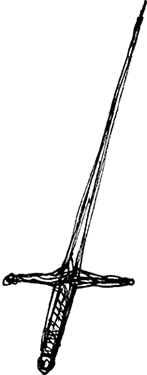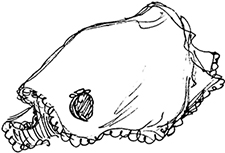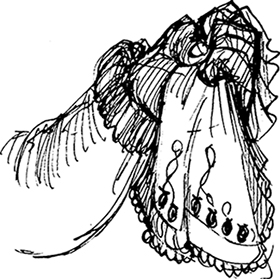
Jones hadn’t seen anything suspicious in the parking lot, or anyone resembling the Crayfish brothers or Rose entering or leaving the tower. In fact, he seemed genuinely angry that he’d missed the chase for the imposter inside the gates. He’d even banged his hands on the steering wheel.
Neil thought the steering wheel looked a bit bent, but Jones seemed to have little trouble using it to guide the vehicle through the streets of London. Not that they had any idea where they were going.
“Othello? Othello? It makes no sense!” Neil said. “There’s no food, no nothing, no misdirection. This is stupid.”

“Isn’t that your particular area of expertise?” Jones grumbled.
“Do you want to find Rose or not?” Neil said, and immediately regretted it. Jones gripped the steering wheel so hard it seemed to bend even more.
“I thought I made it clear earlier that I am tiring of your act.”
Neil considered how he and Jones had been fighting a battle for the past couple of days. He knew Jones had hurt him, but he also knew Jones cared about people, people such as Isabella and Rose. Neil was finding out that this was something that mattered to him more and more.
He uttered two words he’d rarely uttered in his life: “I’m sorry.” It was said in barely a whisper, but it stunned everyone in the van. Neil took a deep breath. “Look, I know I’m not always the easiest person to, well, get along with. I don’t mean to put us in danger. Jones . . . I’m doing my best to help find Rose.”
Jones actually turned around to look at Neil, a confused look on his face. “I—I . . . okay” was all he could sputter before the honking of an oncoming cabbie yanked his attention back to the road.
Isabella gave Neil’s hand a tight squeeze. “Grazie. Neil, it means a lot,” was all she said. Neil thought he saw tears in her eyes.
Neil hadn’t known saying sorry—and actually meaning it—could have such an effect. “I still think beating everyone to the jewel is the best way to solve this whole mess and get Rose back safely.”
Jones didn’t say anything. But he hit the gas, and they sped on faster through the traffic and over the bridge.
Neil’s phone started ringing. This time it was the theme from Batman, which meant Sean Nakamura had finally gotten around to doing some police work.
“I see you finally got around to doing some police work,” Neil said.
“You have a way about you, Nose,” Nakamura said. “It’s not endearing.”
“Sorry,” Neil said, trying out his new word.
“You feeling okay?” Nakamura said. “Or is this an imposter?”
Neil ignored that. “The Queen already assured me it wasn’t her police force shooting at us.”
“Thanks for passing that on to me,” Nakamura said, now annoyed. “Anything else I wasted time finding out about?”
“She said Lord Lane was in financial trouble.”
“Okay, so that’s strike two. Did she mention that the police also think he might be dead?”
“Um, no . . . no, she didn’t say that.”
“The blood on the clothes was definitely his.”
“Why didn’t the Queen mention that?” Neil wondered.
“Can’t say. I would suggest the Queen has a lot at stake here and perhaps is only willing to share information on a need-to-know basis.”
Neil already knew that was true. “Thanks, Nakamura,” he said.
“Thanks? Nose, seriously, go see a doctor. There’s something wrong with that head of yours.”
“Ha-ha. Actually, can you do one last thing for me?”
“I do have a job, you know.”
“The Crayfish brothers. They have Rose. Do you know anything about them?”
“The Crayfish brothers? I don’t even have to make a call for that info. They are notorious for loan-sharking, blackmail, murder, and way worse stuff than that.”
“Worse?”
“They are dangerous. Be careful.”
“Too late. Hey, since that was so easy, can you do one last last thing for me?”
Nakamura sighed.
“Can you check in on Angel and see how the restaurant is doing?”
“I ate there last night. Everything was fine, absolutely fine. Gary has a way with salmon!”
“Nobody suspicious hanging around?”
“Not when I was there.”
Neil let out a sigh of relief.
“Although Gary said he did see a guy taking pictures outside.”
Neil sat bolt upright.
“Pictures?”
“Gary said he was probably a tourist or something. Hey, sorry, Neil. I have another call coming in. Gotta run. See you later.”
“Wait!” Neil said, but Nakamura was gone.
“Everything cool?” Larry said.
“Um, yeah,” Neil said, but the phone call left him rattled a bit. Who was the man with the camera? He’d have to call Gary or Angel later. “He says everything’s cool at home. But the police feel that Lane is possibly dead.”
“Well, that probably explains why the Crayfish have decided to take a more proactive role in the search for the jewel. They can’t rely on Lane to hand it over to cover his debts.”
“Let’s find it first and end this thing,” Neil said.
Larry was poring over the script for Othello, trying to make some sense of the final clue.
“There’s only the one raven reference in the play. Othello and Iago are talking about cheating. Iago mentions a handkerchief. It’s a bit of foreshadowing in the play.”

“Foreshadowing?” Isabella said.
“It means that he’s hinting at stuff that’s coming later. Later on Othello accuses his wife of cheating on him, and the proof is a handkerchief she left behind. Except she was set up. Othello still kills her.”
“This isn’t a comedy, I take it?” Neil said.
“One of the bleakest tragedies, actually, even more so than Richard the Third. In that one you want Richard to get his butt kicked, but in this one you’re hoping things won’t be horrible. It’s a shift in Shakespeare’s plays. You see, he uses the same kinds of situations in his comedies. But things work out well in the end in those.”
“All’s Well That Ends Well,” Jones said, naming one of Shakespeare’s funniest plays.
Larry smiled. “Jones, you can read! That does pretty much sum up his comedies. But in the tragedies, the exact same misunderstandings, mistaken identity, and articles of clothing lead to horrible results. There’s not much difference between comedy and tragedy.”
Neil thought about this. The last clue was meant to sting, to make Shakespeare stop thinking of comedy and start thinking of tragedy.
“Kemp was a clown, right?”
“That’s what Rose said. Kemp acted the goofy roles in Shakespeare’s plays, and then Shakespeare stopped writing those roles after they had their falling-out,” Larry said.
“So what if that’s Kemp’s final point? He’s saying to Shakespeare, ‘Comedy is over for you, now that I’m gone from the troupe.’ ”
Larry considered this. “And just like Othello’s wife—Desdemona was her name, by the way—he’s suggesting that he’s been set up.”
“He’s defending his innocence by making this the final clue about a mistake—a horrible, horrible mistake.”
“If only Kemp, or Shakespeare, had said ‘I’m sorry,’ perhaps things would have turned out differently,” Isabella wondered.
Neil nodded. “Let’s put aside the question of how Kemp knew about Othello and just assume he did somehow. The reason Othello accuses his wife is a handkerchief. Maybe Kemp is making some fashion-related hint?”
“After all the food clues?” Isabella said.
“Well, let me look at the play again.” Larry searched for the word “handkerchief.” “It comes up like thirty times in the play. But, whoa . . .”
“What?” Neil said.
“A few scenes later, as they get closer and closer to the tragedy, Iago is describing the handkerchief to Othello, and Othello knows it’s the right one because it has stains on it from strawberries.”
“The same food Richard the Third was eating in the last clue?” Neil said.
“Exactly. But here the red stain of the strawberries is foreshadowing the red of the blood that will be spilled over this tragic handkerchief.”

Neil tapped his fingers on the car seat. What was Kemp getting at with this clue? Thinking as someone walking around five hundred years ago had helped him see the tower in a different light. “Maybe we need to stop thinking like modern people and put ourselves into their brains.”
Larry snapped his fingers. “What if Kemp and Shakespeare didn’t fall out over any of the stuff we think of as normal today?”
“Like?”
“Well, we assume they argued and broke up over money or power, or some battle for control of the Globe Theatre.”
“But Shakespeare is all about those problems. They aren’t just modern,” Isabella said.
“Yeah, but this last quote is about infected houses and the plague and tragic misunderstandings, not power or money or that other stuff.”
“So?”
Larry moved to the edge of his seat in excitement. “It might be crazy, but what about this? Kemp is sick. He’s coughing blood into a handkerchief or something. Shakespeare sees this, and like anyone else from that time period, he panics. Illness, the plague—this is the worst thing that can happen, right?”
“Understandable,” Isabella said. “It sounds awful.”
“Exactly, so Shakespeare exiles Kemp. He maybe even rats him out to the health authorities. Kemp gets banned from public spaces. He’s not allowed to work for weeks or maybe months. That essentially finishes Kemp’s career.”
“Which might explain why he was living in a seedy part of town,” Neil said.
“As a possible plague victim, he’s refused food and medical treatment and thrown out of the high society of the theater. Maybe he’s even locked up in a house.”
Neil nodded. “But this first time, Kemp doesn’t die. They only thought he had the plague.”
Larry clapped his hands, his mind racing. “And he’s so cheesed at Shakespeare that after he gets out of the ‘infected house,’ he sets out to ruin him. He steals one of his jewels and hides it as a kind of revenge. But then he does actually get the plague, and dies before he can deliver his poem.”
They sat in silence for a few minutes, considering Larry’s idea. “It’s not actually that crazy,” Neil said at last.
“High praise, golly, thanks,” Larry said. “It’s the best I can do in a tea-drinking country.”
“It does tie in a lot of the references. It might even explain his fixation on food, something that had become a luxury for him.”
Isabella joined in. “And why he goes on this pazzo—crazy—dancing journey. He’s desperate for fame, attention, a way to get back into that world.”
Jones slowed down the car and pulled into a side street and parked.
“Why are you stopping?” Neil said.
“Did you see something? Are we being followed?” Isabella asked.
“No,” Jones said. “I actually think Larry’s theory might be right.”
“Great!” Larry said. “So let’s get moving!”
Jones leaned back in his seat and turned off the ignition. “Think just a tiny bit more.”
“I might actually need a coffee for that,” Larry said. “I’m exhausted.”
Isabella slumped in her seat as well, clearly more used to Jones’s body language. “Sì, I understand. There’s just one last problem. We have absolutely no idea where this last clue is telling us to go!”